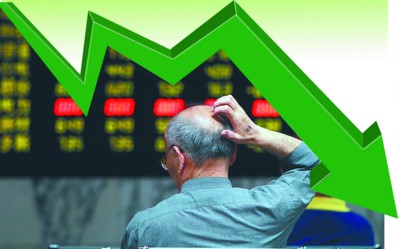Chinese investors again experienced a roller coaster ride on Tuesday. After the Shanghai Composite tanked by more than 8%, earning it the nickname 'Black Monday', the index dropped sharply again for a second straight day, falling by over 7%. That puts the index a whopping 42% from its peak in June.
中国股民在周二仿佛又经历了一次过山车。上证综合指数下跌逾8%后便有了“黑色星期一”这一称谓,该指数在第二天继续大幅下跌逾7%。这使得该指数自六月峰值之后高达42%。
Faced with this new rout, local investors -- many of who are still reeling from the meltdown that began in June -- posted reactions across Chinese social media ranging from dark humor and despair.
此次股灾始于六月份,许多当地股民尚未摆脱其当时的不良影响。面对新一轮暴跌,他们通过社交媒体发帖来表现自己的黑色幽默,表达自己的绝望心情。

"The stocks I bought have dropped so cruelly," one Weibo user posted. "In a previous session, I made 200,000 (yuan). Because I was greedy I wanted to make more, like a snake trying to eat an elephant. I watched my money, everything that I made and some of my original investment (disappear). My heart is bleeding! The only lucky thing is that I was able to pull out most of the original funds in time."
“我买的股票跌得十分厉害,”一位微博用户发帖说。“上个交易日我还挣了20万元,但因为自己太贪心,还想挣更多。人心不足蛇吞象。眼看着自己的钱,自己所创造的一切,以及一些原始投资不见了。我的心在滴血!唯一幸运的是我能够及时撤出大部分原始资金。”
Some of the biggest victims of the crash have been ordinary Chinese people. A large-scale survey of households in China from late last year showed that two thirds of new investors in the Chinese stock market didn't complete high school.
股市下跌的最大受害者中,有些只是普通百姓。去年年底的一次大规模调查显示,中国股市中,三分之二的新股民甚至没有读完高中。
"The Chinese market is not mature. Ordinary people were jumping on the bandwagon with money they worked hard to earn. " a Weibo user wrote.
“中国股市尚不成熟。有些人只是在拿着自己辛苦赚来的钱盲目地随波逐流。”一位微博用户写道。
The comparisons even got slightly poetic: "The stock markets right now are like a bad boyfriend. Time after time you believe his promises to become good but then every time he disappoints by breaking another new record and hurts you."
有的比喻甚至有些诗意:“现在的股市仿佛一任坏男友,你一次次相信他的诺言,相信他会变好,可是呢,每次他都打破另一项新纪录使你失望,令你心伤。”
At the root of the stock market crisis are investors who continue to pour money into Chinese stocks even though real economic growth and company profits are weak, which wouldn't happen if share prices were able to reflect a company's true value.
股市危机的根源在于,即使经济增长缓慢,公司利润薄弱,股民却依旧将钱投入股市,若是股价可以反映公司的真实价值,此类现象便可以避免。













